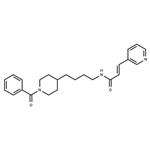Description
Daporinad (FK866, APO866) effectively inhibits nicotinamide phosphoribosyltransferase (NMPRTase) with IC50 of 0.09 nM in a cell-free assay. Phase 1/2.
In vitro
APO866 at low concentrations ranging from 0.09-27 nM induces dose-dependent cytotoxicity in 41 hematologic malignant cells including acute myeloid leukemia [AML], acute lymphoblastic leukemia [ALL], mantle cell lymphoma [MCL], chronic lymphocytic leukemia [CLL], and T-cell lymphoma. APO866 at low concentrations ranging from 0-10 nM induces cell death, this effect is independent of caspase activation but is associated with depolarization of mitochondrial membrane. APO866 at concentrations ranging from 0-10 nM dose-dependently induces depletion of intracellular NAD and ATP contents and cell death in various hematologic cancer cells. APO866 at concentration of 10 nM inhibits PBEF-induced secretion of MMP-3, CCL2, and CXCL8 in HFFF2 cells.
In vivo
APO866 administered intraperitoneally at dose of 20 mg/kg twice a day for 4 days, repeat weekly over 3 weeks, prevents and abrogats tumor growth in C.B.-17 SCID mice xenograft models of human AML, lymphoblastic lymphoma, and leukemia. APO866 at dose of 0.12 mg/kg/hour prevents joint destruction and leukocyte infiltration through inhibition of PBEF in mice with CIA.
Description
FK-
866 is a highly specific non-
competitive inhibitor of Nampt (K
i = 0.4 nM), causing gradual NAD
+ depletion. In HepG2 human liver carcinoma cells, NAD
+ depletion by FK-
866 directs delayed cell death by apoptosis (IC
50 = ~1 nM). In normal human smooth muscle cells, FK-
866 causes premature senescence, an effect that may be linked to decreased activity of the NAD
+-
dependent enzyme SIRT1. Also, FK-
866 induces autophagy in SH-
SY5Y neuroblastoma cells, as indicated by the formation of LC3-
positive vesicles.
Uses
FK866 hydrochloride hydrate has been used:
- to investigate its effects on intra-axonal NAD+ levels
- to induce NAD+ depletion
- to reduce the level of tumor necrosis factor-α (TNF-α), nicotinamide phosphoribosyltransferase (NAMPT) and interleukin-6 (IL-6) in the ischemic brain tissue
Definition
ChEBI: FK-866 is a member of benzamides and a N-acylpiperidine.
General Description
A cell-permeable pyridinylacrylamide compound that acts as a selective, allosteric NAPRT/NAMPT (nicotinamide phosphoribosyltransferase) inhibitor (K
i = 0.4 nM for the enzyme/substrate complex; K
i′ = 0.3 nM for the free enzyme), while exhibiting no effect toward NPRT (nicotinic acid phosphoribosyltransferase) activity (82% inhibition of NAPRT activity at 10 nM vs no inhibition of NPRT activity at 1 μM in K-562 extract). FK866 treatment is shown to induce cell death by depleting NAD
+ (Cat. Nos. 481911 & 481915) in HepG2 and NIH-3T3 cultures (by >95% after 24 h treatment of 10 nM FK866), likewise the addition of exogenous NAD
+ is demonstrated to rescue NIH-3T3 and SH-SY5Y from FK866-induced NAD
+-depletion and cell death.
Biochem/physiol Actions
FK866 is a potent inhibitor of NAD biosynthesis, and a specific inhibitor of NAMPT (Nicotinamide Phosphoribosyltransferase, visfatin, PBEF). NAMPT functions as an intra-cellular and extra-cellular NAD biosynthetic enzyme that is important for regulating metabolism and stress resistance through sirtuins and other NAD-consuming regulators. NAMPT also acts as a cytokine independent of its enzymatic activity, playing a major part in regulating immune responses.
References
[1] nahimana a, attinger a, aubry d, greaney p, ireson c, thougaard av, tjørnelund j, dawson km, dupuis m, duchosal ma. the nad biosynthesis inhibitor apo866 has potent antitumor activity against hematologic malignancies. blood. 2009 apr 2; 113 (14): 3276-86.
![(E)-N-[4-(1-BENZOYL-PIPERIDIN-4-YL)-BUTYL]-3-PYRIDIN-3-YL-ACRYLAMIDE Structure](https://www.chemicalbook.com/CAS/GIF/658084-64-1.gif)


